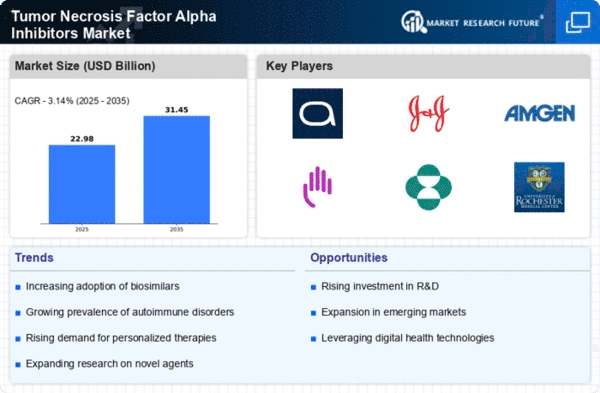Market Trends
Key Emerging Trends in the Tumor Necrosis Factor Alpha Inhibitors Market
The Tumor Necrosis Factor Alpha (TNF-α) Inhibitors Market which targets inflammatory diseases like rheumatoid arthritis and inflammatory bowel diseases has seen dynamic measures for the further thematization of their markets by pharmaceutical companies. A basic strategy involves always coming up with new treatment products. In this regard, pharmaceutical companies are allocating enormous funds to the area of research and development in order to innovate TNF-α drugs. Through the discovery of medicines that have distinct mechanisms of action and a significant improvement in patient outcomes, these companies are looking for ways to differentiate themselves from the others in the market and take their portion of the pie by addressing the differing needs of those suffering from these conditions.
Strategic partnerships and collaborations make up a vital component in the differentiation of the market share of TNF-α Inhibitors Market. Due to the complex dynamics of inflammatory conditions and the requirement of multifaceted interventions, companies are teaming up with research study centers, healthcare institutions, and other corporate partners. The joint ventures help to speed up and intensify the research and commercialization of the working TNF-α inhibitors by sharing the resources, knowledge, and experiences. Through the combination of the assets, the businesses become the driving force in the market by bringing unique holistic solutions to the table which are capable of tackling the multiple factors of the inflammatory conditions.
Pricing fundamentals that are part of those competitive strategies positioning are also significant for TNF-α Inhibitors Market. Companies implement the various of pricing models which take into account among others treatment efficacy, patient affordability, and reimbursement considerations. Some of the manufacturers adopt high-end marketing strategy which stresses their TNF-α inhibitor’s outstanding benefits, while others sell these drugs at affordable price to address a vast range of patients. Coming up with the perfect balance between affordability and value perception is at the heart of the strategy of any organization that wants to remain competitive and cater for the divergent economic statuses of this treatment's consumers.
To make the TNF-α inhibitors market more competitive and gain more market share, effective marketing and distribution strategies are very important. Companies spend huge sums on marketing campaigns, which are aimed at increasing the recognition of their options among medical practice operators and patients. As a result of branding through targeting promo elements a brand is able to gain trust and credibility. Simultaneously, we also need to fine-tune our distribution network so that TNF-α inhibitors are delivered to wide-reaching areas and in that way reach many varied areas through the country. Such good product placement is a strategic marketing action that enhances visibility and leads to increasing market share.


















Leave a Comment